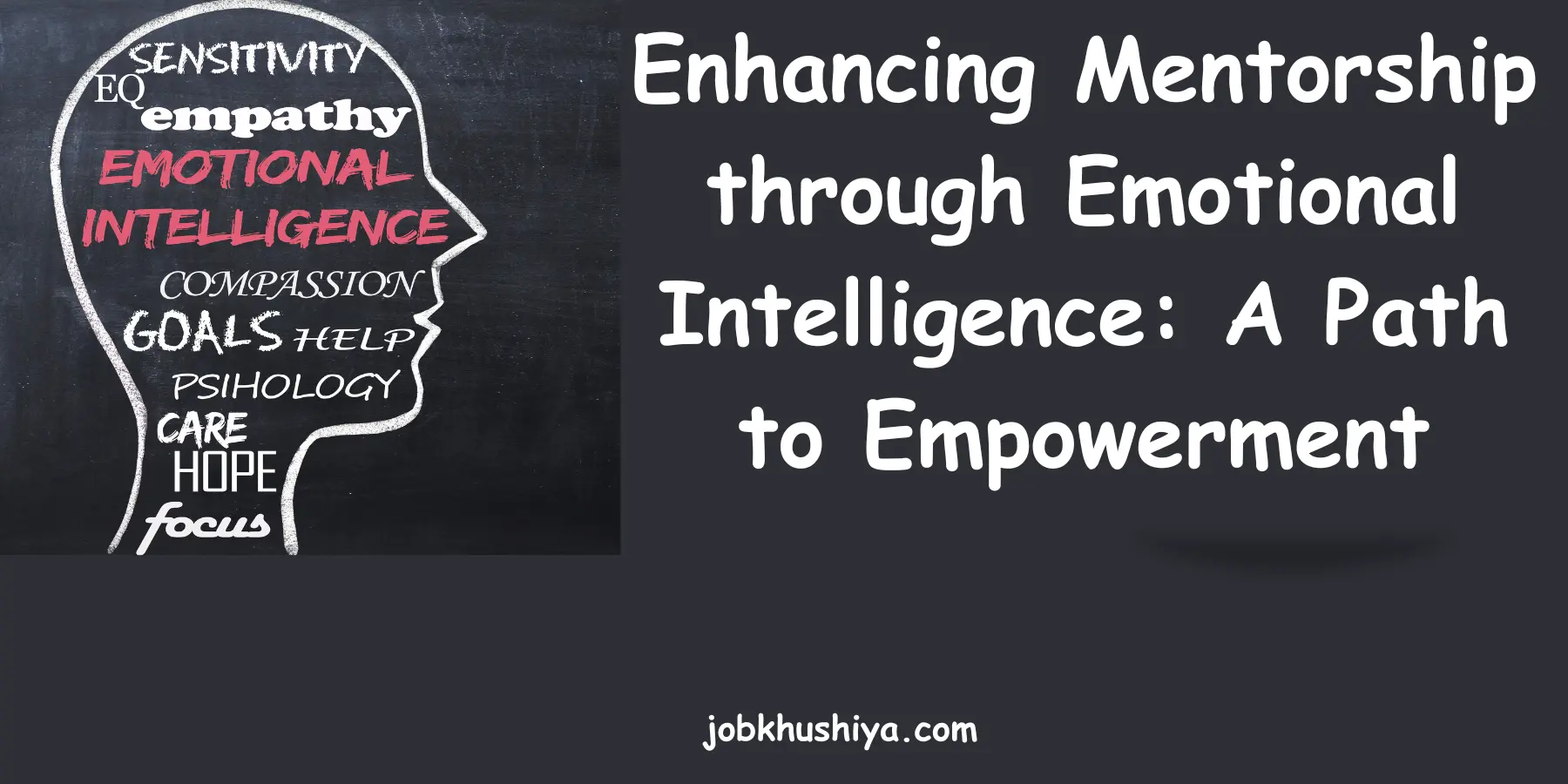Introduction:
Mentorship is a profound relationship where guidance, support, and wisdom are shared to nurture growth and development. Whether in professional realms, academia, or personal pursuits, mentors play a pivotal role in shaping individuals’ journeys. However, being an effective mentor entails more than just dispensing knowledge; it requires empathy, understanding, and emotional intelligence. In this blog post, we explore how cultivating emotional intelligence can elevate your mentorship abilities, fostering deeper connections and empowerment.
Understanding Emotional Intelligence:
Emotional intelligence (EI) encompasses the capacity to recognize, understand, and manage both our own emotions and those of others. It comprises several key components, including self-awareness, self-regulation, empathy, and social skills. While traditional mentorship often focuses on the transfer of technical expertise, integrating EI principles can significantly enhance the mentor-mentee dynamic.
The Role of Empathy:
Empathy lies at the heart of effective mentorship. By empathizing with your mentee’s experiences, challenges, and aspirations, you create a supportive environment where they feel heard and understood. Through empathetic listening, you gain insight into their perspectives, facilitating more tailored guidance and advice. Empathy fosters trust and rapport, essential elements for meaningful mentorship relationships to thrive.
Building Self-Awareness:
Self-awareness is foundational to EI and mentorship alike. As a mentor, understanding your own strengths, weaknesses, and biases enables you to approach interactions with authenticity and humility. By acknowledging your limitations, you create space for continuous learning and growth, modeling resilience and adaptability for your mentee. Self-aware mentors are better equipped to provide constructive feedback and navigate challenging conversations with sensitivity and grace.
Practicing Self-Regulation:
Mentorship inevitably involves navigating complex emotions and interpersonal dynamics. Cultivating self-regulation allows you to manage stress, frustration, or impatience effectively, preventing these emotions from overshadowing the mentoring process. By maintaining composure and a positive attitude, you demonstrate resilience and professionalism, setting a positive example for your mentee. Self-regulation fosters an environment conducive to open communication and mutual respect.
Enhancing Empowerment through EI:
Ultimately, the goal of mentorship is to empower mentees to realize their full potential. Emotional intelligence serves as a catalyst for this empowerment journey. By validating mentees’ emotions, encouraging self-reflection, and fostering a growth mindset, you equip them with the tools to navigate challenges and pursue their goals with confidence. EI empowers mentees to cultivate resilience, adaptability, and emotional agility, essential attributes for success in any endeavor.
Practical Strategies for Developing EI in Mentorship:
- Practice active listening: Focus on understanding your mentee’s perspectives without judgment or interruption.
- Foster a culture of feedback: Encourage open dialogue and constructive criticism to facilitate mutual growth.
- Lead by example: Demonstrate empathy, self-awareness, and self-regulation in your actions and communication.
- Provide support and encouragement: Celebrate successes and offer encouragement during setbacks, reinforcing a positive learning environment.
- Prioritize relationship-building: Invest time in cultivating trust and rapport with your mentee, fostering a strong foundation for mentorship.
Emotional intelligence (EI) can significantly enhance one’s ability to become a better mentor in several ways:
- Understanding Mentees’ Emotions: With high EI, you can better perceive and understand the emotions of your mentees. This enables you to empathize with their struggles, frustrations, and aspirations, fostering a deeper connection and trust between you and your mentee.
- Effective Communication: EI aids in effective communication by allowing you to convey your thoughts, feedback, and guidance in a manner that resonates with your mentees’ emotional state. Clear and empathetic communication ensures that your mentees feel heard and valued, enhancing their receptiveness to your mentorship.
- Building Rapport: Mentoring is not just about transferring knowledge; it’s also about building a meaningful relationship. High EI facilitates the establishment of rapport with your mentees by showing genuine interest, providing support, and being responsive to their emotional needs.
- Managing Conflict: Conflict is inevitable in any mentoring relationship, but with EI, you can navigate through conflicts more smoothly. By regulating your own emotions and understanding the emotions of your mentee, you can address conflicts constructively, turning them into opportunities for growth and learning.
- Motivating and Inspiring: As a mentor, you play a crucial role in motivating and inspiring your mentees. EI enables you to inspire them by recognizing their strengths, encouraging their progress, and providing constructive feedback in a way that motivates rather than demoralizes.
- Adaptability: Every mentee is unique, with different personalities, backgrounds, and needs. High EI allows you to adapt your mentoring style to suit the individual preferences and emotional nuances of each mentee, maximizing the effectiveness of your mentorship.
- Self-Awareness and Improvement: Finally, EI fosters self-awareness, which is essential for continuous personal and professional growth as a mentor. By reflecting on your own emotions, behaviors, and interactions with your mentees, you can identify areas for improvement and strive to become an even better mentor over time.
In essence, emotional intelligence is not just a desirable trait for mentors; it’s a fundamental aspect that underpins effective mentorship. By leveraging EI, you can create a supportive and empowering environment that enables your mentees to thrive and reach their full potential.
Conclusion:
Emotional intelligence is a powerful tool for enhancing mentorship effectiveness and fostering mentee empowerment. By cultivating empathy, self-awareness, and self-regulation, mentors can create supportive environments where mentees feel valued, understood, and inspired to grow. Integrating EI principles into mentorship not only enriches the mentoring experience but also cultivates essential skills for navigating life’s complexities with resilience and compassion. As mentors, let us embrace the transformative potential of emotional intelligence to empower and uplift those we guide on their journey of growth and discovery.
